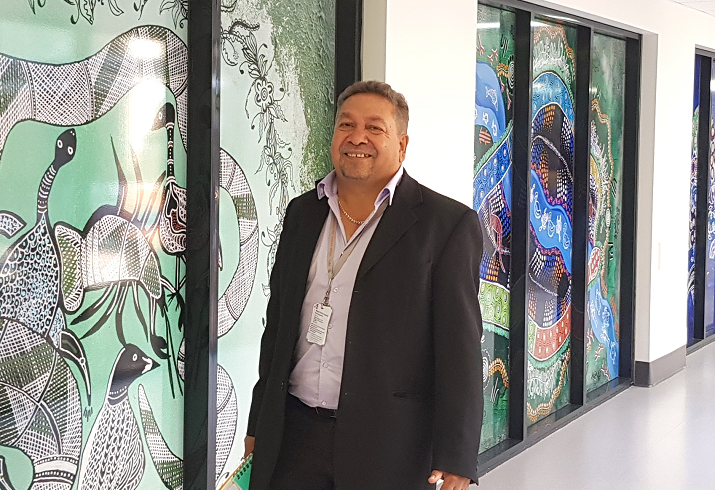Ian Gentle's story

Ian Gentle is the Senior Project Officer – Cultural Security in the Aboriginal Health Strategy team at EMHS. Every day Ian works to build cultural respect and security for Aboriginal people, patients and staff.
Here is Ian’s story, in his own words:
“I was born in Midland, grew up at Allawah Grove Aboriginal Reserve near Perth Airport, and finished primary school in Meekatharra. During the school holidays I could play and work on the sheep stations and I developed a strong work ethic that I’ve carried throughout my life. It was here that I first started seeing the cultural ways of Aboriginal people lived out in daily life.
My mother’s tongue is Whadjuk Noongar, and my father’s tongue is Wadjarri, but during my childhood I was not able to learn my language or parts of my culture. It was only when I moved to the Northern Territory as a teenager, and then to South Australia where I worked for 21 years with Aboriginal communities, that I learnt about the important elements of Aboriginal culture, and the different cultural protocols and languages of each community.
In the Northern Territory I saw how Aboriginal people managed their communities based on respect, cultural lore and hierarchy of the Elders. There was a deep concern for the next generation that drove the Elders to create a life and environment that would help their young people stay clean and strong. In South Australia, I learnt about the connectedness between people and places as I travelled throughout the state. My car was my office and I slept in my swag between towns while I worked in different areas across State and Commonwealth departments as a conduit for Aboriginal people.
From my cultural learnings in the Northern Territory and South Australia, respect, mutual obligation and responsibility became the essence of who I am and what I value. They guide how I relate and connect with people, follow the lead of my Elders in passing on our cultural heritage, and work with Aboriginal people towards a common goal.
Helping the Aboriginal community has been a key part of my working life. The most rewarding of these experiences was when I worked with an Aboriginal community in the far west at the University of South Australia. I saw how a community can make positive change happen by building on their strengths to make a difference.
My decision to work in health was also influenced by my experience in other sectors. I recognised that people first need to be healthy to access services, and to interact with their culture. The number of young people I saw suffering from diabetes, a health condition that can either be prevented or managed, struck a deep chord in me.
Now, at EMHS, I continue to work with people, for the people to improve the health of Aboriginal people. I left WA as a teenager looking for a place to belong. I’ve lived in and been to many beautiful, amazing places in the Northern Territory and South Australia. Being home in Western Australia has allowed me to connect to who I am as a Noongar/Yamatji Man with my family and community. It’s funny, I was looking in all of these places for what was here in Perth all along – my land, my home, my place.”

